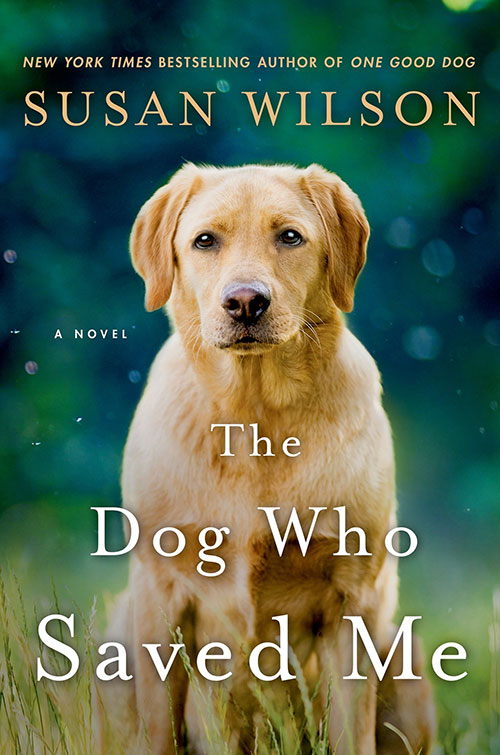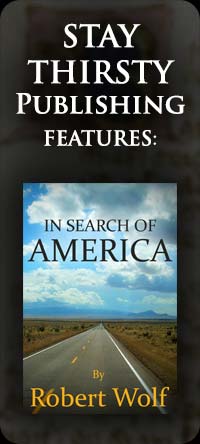

A Conversation with Novelist Susan Wilson
By THIRSTY

Susan Wilson
(credit: Mark Alan Lovewell)
Susan Wilson is an award-winning, New York Times bestselling author of nine novels. Her latest book, The Dog Who Saved Me, was released last spring. Critics have found her work to be "moving, tender, and brilliantly crafted," with unexpected endings and page-turning drama. She is the recipient of the Maxwell Medal for Fiction and her novel, Beauty, was made into a television movie. Stay Thirsty Magazine was very pleased to visit with Susan Wilson at her home on Martha's Vineyard for this Conversation about dogs, writing and family.
STAY THIRSTY: You have published nine novels during your career and your latest, The Dog Who Saved Me, has been called compelling, poignant and uplifting. It is your fourth book with a dog as one of the major characters. Your five earlier books were in the human romantic genre. What made you switch your focus to stories centered on dogs?
SUSAN WILSON: Thank you so much for inviting me to participate in this interview. It's a pleasure to be introduced to STAY THIRSTY.
I'd had four novels published in quick succession, then hit a dry spot. The novel that I'd been working on for what seemed like years failed to catch the eye of any publisher. I was about ready to quit when my agent, apropos of nothing, said, "You know, dog stories are really popular now." This was about the time The Art of Racing in the Rain had come out, as well as the Edgar Sawtelle story. To say it was like being hit with lightening would be to fall into a cliché, but, it was, in fact, a fou de coudre. As a kid, I read voraciously, and my preferred topic was animals, especially dogs. The work of Albert Payson Terhune (Lad: A Dog, Gray Dawn) inspired my own desire not only to write, but to own collies. So when Andrea [my agent] made that almost off-hand comment, it was the perfect conflation of my two passions. Although, I'm almost sorry to say, I've never written about collies.
Although my work revolves around the relationships between humans and dogs, it is also, at heart, really about the relationships between human beings. I use the fictional dog(s) as a literary device to move the story forward, to allow the characters to develop. In The Dog Who Saved Me, the parallel narratives of the human protagonist, Cooper, and the nameless yellow dog, both having to overcome trauma and learn to trust again, work to tell the whole story, which is really about Cooper's very difficult relationship with his father and brother.
STAY THIRSTY: Reviews of your stories about dogs have highlighted the special relationship between men/women and dogs. What is it about dogs that make them such an important part of our lives?
SUSAN WILSON: I'd have to say that it is the partnership aspect of the relationship. I'm no animal scientist, but I can't think of another four-footed creature who so ably fits into our lives with such a variety of purposes and with such joy. From the time the first canine figured out that there was free food for the having if he just hung around the perimeter of the campfire defending it from predators, to the modern dogs who sniff out cancer, the multiplicity of tasks has made them our all purpose partners. Maybe it's that our kind have depended on their kind for so long, that there is a thinning of the border between our sensibilities and theirs. We understand them better, I think, than in any other epoch. They have always understood us.
STAY THIRSTY: There has been much written about the intelligence and perception of dogs and how they have evolved to not only manipulate their owners, but also to draw comfort from them. In your own experience, do you believe that dogs think, plan, have emotions and use strategy to get what they want?
SUSAN WILSON: If my own dog is any example of that, yes. She is the most manipulative creature on the planet. This is a true story. She likes to sleep on the end of couch where the table lamp is, the very spot I want to sit to have my coffee and read. I make her move over. Suddenly, she's at the cellar door that leads to our television room, where she has a collection of chew bones. I sigh, put down the book, and go open the door for her. At which point she leaps back into my seat. Conniving? Clever? Strategic planning? Oh, yes. By all means.
I also think that we are sometimes training our dogs without realizing it. To do the same thing at the same time every day trains the dog into expectation. Expectation of a walk, or a treat, becomes part of the communication between human and canine. I think that dogs do derive comfort from a familiar routine; that our own habits instill in them a sense of security. They are entirely dependent upon us, and when something is out of sync, they know it, and that can seem to have an emotional result. When we get ready for a trip and the suitcases come out, my dog gets right in the way, as if to let us know she's planning on going with us. When we tell her "bye-bye" the look on her face is an eloquent mask of despair. Don't tell me she isn't disappointed. I can read it in her eyes. When we get home, the first thing she does is ask us to get back into our familiar routine, by which she means two cookies and some couch time.

STAY THIRSTY: Dogs seem to give unconditional love and loyalty to people in ways that people do not give to themselves. What is it about the human condition that draws us to share our lives with such remarkable animals?
SUSAN WILSON: Simply put, they don't judge. And they don't talk; give neither advice, nor criticism. The book that I'm working on right now takes a look at this: why a dog has such attachment to an unworthy, in fact quite dangerous, young man. And how the negative perception of this young man is altered in the eyes of those who would take this dog away from him by that dog's obvious devotion.
STAY THIRSTY: You dedicated The Dog Who Saved Me to your daughters, Elizabeth and Alison, calling them your "best creations." Why did you decide to dedicate this book to them? Did dogs play a role in their upbringing?
SUSAN WILSON: That was more the result of Mom-shaming. It seems as though I hadn't dedicated a book to them prior to this, only to the more generic-sounding "family." When they were growing up we had a collie who was a wonderful family dog, as collies always are. They are now adult women with dogs (and families) of their own. We are a dog-loving extended family, so dogs are part and parcel of any gathering.
STAY THIRSTY: When you are deciding on a storyline for a book, do you plan out the entire plot or do you let the story travel where it wants to?
SUSAN WILSON: I've done both, and have found that at the end of the day, the story does go where it wants to go. I find that writing is a bit like being on a river, the raft sometimes gets channeled into a tributary and the route changes. Not to say I don't end up where I was meant to, just that as the details began to evolve, so does the story. However, having at least a rough outline does help when I get stuck on the shoals.
STAY THIRSTY: Your writing communicates very strong and compelling emotional feelings in each story. How have your views on human relations changed over your writing career? What have you learned about how storytelling works?
SUSAN WILSON: I always say that if I don't make the reader cry, I haven't done my job. Emotion is one of the essential ingredients in good storytelling. If a story doesn't grab you by the heart, it's not interesting. You have to engage your reader and sometimes, for me, that means pushing myself into arenas I'd rather not enter. Case in point, the dog-fighting world that my first canine protagonist comes from. It's ugly and hard to write about, but necessary to make an emotionally strong book.
I would also say that it's really all about character, that is, writing characters that slip beyond the restrictions of the flat page and become fully fleshed in the reader's mind is what creates that emotional connection. A good writer can have a character simply walking down the street, and if that character is believable and engaging to the reader, then a simple walk can become a great story. On the other hand, if the emotional connection is lacking, there's nothing to save the story.
I can't say that my worldview, regarding human relations, has been influenced so much by my writing as my writing has been influenced by the state of humanity. As we all know, there's an endless flow of information, news, opinion. All of it served up as absolute. This one committed the crime, that one is a hero. This group is wrong, that group is right. But, there are no absolutes, no one is all bad or all good. And that place, the space between, is where the best characters are. Where the stories are.
STAY THIRSTY: Your nine books have both male and female leading characters. Do you feel more comfortable writing in the male or the female voice?
SUSAN WILSON: I think I like writing from the male POV better than the female, but I have no good answer as to why that might be. Perhaps it's because men are complicated and offer themselves better as the flawed creatures they are. Flaws, of course, are what make a story. Colm Toibin writes women beautifully, so he probably feels the same way in reverse.
STAY THIRSTY: You are a New York Times bestselling author and one of your books was made into a television movie. As a seasoned writer, what other achievements do you dream about or have your sights set on?
SUSAN WILSON: The Pulitzer? Kidding—sort of. When I was starting out, all I could hope for was publication. I have been blessed in that I have been able to make a living at this hard and sometimes treacherous business and I know that at any time, the train may pull into the station and I'm asked to get off. So, in the meantime, I intend to keep working at my craft. Each new book is an education, and I learn something about writing every time. My goal is to keep engaging readers, entertaining them, and that is an achievement. Of course I hope to appear on the NYT list again, higher up, if you please.
STAY THIRSTY: Are there more books about dogs in the works?
SUSAN WILSON: Absolutely. As I mentioned above, I'm at work on a new novel that brings my original dog and man team back to the page as secondary characters. After that, I know that I'll do at least two more books involving that exploration of the human/canine bond.
Link:





